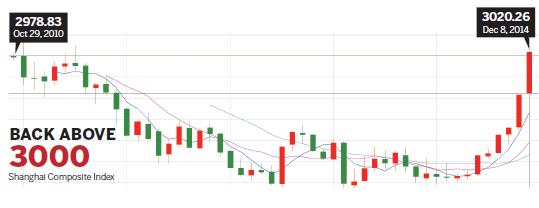Hard lesson learned as market continues to rise
By Bloomberg And CAI XIAO (China Daily) Updated: 2014-12-09 03:34

Wang Cheng, a 26-year-old in Beijing who has invested in stocks for four years, says he has learned a lesson amid a rising market.
He saw a 100 percent return from the start of 2013 to the end of March this year, but has not made any money since the Chinese A-share market started to thrive.
In May, he put all the money he could afford to invest in Shanghai-listed Yonyou Software Co after careful study, buying at the low price of about 12 yuan ($1.95) per share.
But as the market rose in September and there had been no significant change in the Yonyou share price, Wang decided to sell his shares to earn some quick money, having invested in a stock he was unfamiliar with.
"Now I feel sad because the Yonyou price started to rise quickly soon afterward, closing today at 27.8 yuan, an increase of 70 percent on my selling price.
"I have come to my senses and the lesson I have learned from the bull market will help to steady my investment choices," Wang said.
His comments come as the Shanghai Composite Index passed 3,000 for the first time in three years on Monday. The gauge of the nation's biggest companies capped a record winning streak on hopes that shares will extend their world-beating rally.
The Shanghai index rose by 2.8 percent to close at 3,020.26, the highest level since April 2011.
The CSI 300 Index rose by 4.1 percent, extending gains to 28 percent during a 12-day advance. Heavyweight blue chips such as banks, brokerages and property stocks performed well.
Valuations by brokerages have surged to their highest level in more than four years, with Citic Securities Co and Haitong Securities Co, the nation's biggest securities firms, rising by 10 percent on Monday. Ping An Insurance (Group) Co increased by 9.6 percent, while Sany Heavy Industry Co rose the most in a decade.
China's securities regulator is urging caution when investing in stocks amid the recent rally.
But Daphne Roth at ABN Amro Private Banking said equities have further room to gain as valuations remain cheap and the government may loosen monetary policy to support the economy.
"There's a lot of buying from retail investors," said Roth, head of Asian equity research at ABN Amro, which oversees about $230 billion.
"Short term, if I look at the technicals, it's (the market) still powering ahead. I expect it to rise for the rest of the year. For the mid-to-long term, we are still positive."
- Cash crunch fans expectation on RRR cut
- US extends antidumping duties on China's thermal paper
- Modern food van with ancient look in Shanghai
- China home prices continue to cool in November
- Asia's top 3 billionaires all Chinese
- Old investment remedy the treatment for China's "new normal"
- China's solar sector opposes US anti-dumping ruling
- BMW to recall 846 cars in China
















